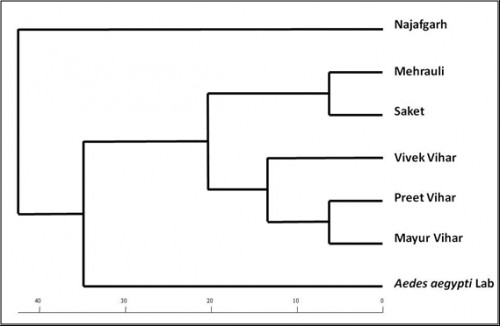Vol. 4, Issue 4, Part A (2017)
Evidence of genetic polymorphism in Aedes aegypti population from Delhi, India
Author(s): Varun Tyagi, Ajay Kumar Sharma and Vijay Veer
Abstract: Aedes aegypti is a domestic mosquito found mainly inside and around the house causes biting nuisance and also a vector of dengue, chikungunya and zika virus worldwide including India. Overall mosquito-borne diseases have re-emerged as a significant human health problem due to a number of factors, including the lack of progress in vaccine development, the emergence of drug resistance in pathogens and insecticides resistance in mosquitoes. An alternative strategy for vector control could be to exploit observed genetic variability in the vector populations. In the present study RAPD primers were used to understand the genetic polymorphism present in the Aedes aegypti populations collected from various locations in Delhi. A total of 50 RAPD primers were screened. Among these, the primer OPAK 12 was selected for further study on the basis of the clear, concrete and scorable fingerprint obtained by it. The statistical analysis was done with the help of POPGENE 1.31 using 17 bands or loci representing each population. The average genetic distances between the populations was 0.5624 ranging from 0.1252-1.1015. The consensus tree generated using the software showed two clusters which are branched as per their geographical distances. In conclusion we propose that our results on RAPD profiles provide evidence that there are enough and significant variations in the genomes of field collected populations from distant locations and the genetic pattern obtained in its various forms appears to be a major differentiating and orienting force for molecular changes in DNA across different populations.
Related Graphics: Click here for more related graphics

Fig.: Phylogenetic tree representing Field populations of Aedes aegypti
Pages: 58-63 | 2061 Views 204 Downloads

How to cite this article:
Varun Tyagi, Ajay Kumar Sharma, Vijay Veer. Evidence of genetic polymorphism in Aedes aegypti population from Delhi, India. Int J Mosq Res 2017;4(4):58-63.







